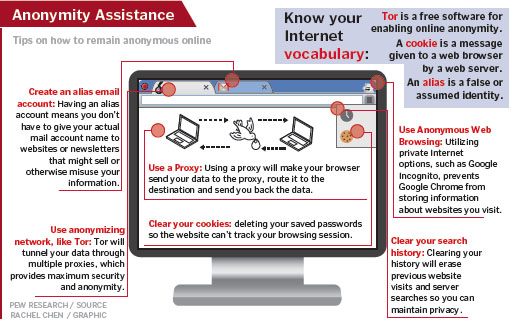Which would you prefer: convenience or privacy? This is a choice many Americans must now face.
New studies show that as online computer technology has progressed, privacy has only digressed. What may have once been expected in regards to online privacy is now highly sought after. According to a September 2013 study conducted by the Pew Research Center, 86 percent of internet users in America have tried to conceal their online activity. The visible decline in anonymity is a growing concern for 68 percent of users who say that current privacy protection policies against the National Security Agency (NSA) are not enough. For its part, CHS has its own form of online surveillance with the installation of Vision Client on school computers. 
Vision Client is a software that monitors students’ activity on the computer. According to Assistant Principal Christopher Glander, it allows teachers to watch and control what students are doing on the computer.
“We installed this software so teachers can supervise their students’ activity (on the) computer,” he said. “You can watch what they’re doing when you’re outside of the room.”
Theresa Ramos, media and communications department chairperson and media specialist, said Vision Client primarily serves as a teaching tool.
“It allows teachers to adjust their teaching styles to better help the students,” she said.
Americans are finding privacy more difficult to achieve, especially teenagers. For example, 45 percent of parents of teen online users install monitoring software on their teens’ home computers. They rationalize this to be more of a safety precaution, not a privacy infringement. However, many people question the line between safety and excessive monitoring.
Sophomore Jacob Riedel said that while he does not like the software, it is a necessary feature on school computers.
“When you’re on a school computer, you shouldn’t be doing anything you’re not supposed to do anyway,” Riedel said. “Teachers should watch what we’re doing.”
However, according to Riedel, he believes that there should be a limit to the surveillance.
“I think monitoring 24/7 would be going too far,” he said. “You paid for your internet, so (the NSA) can’t completely control what you do.”
However, there is a distinct difference between the NSA’s monitoring and school’s monitoring. The school is a public workplace that is free domain for Vision Client to watch. Conversely, while on a private computer, it is expected that the NSA will not monitor the user. At this school, administrators view computer software like Vision Client as a mere extension of what teachers already have the ability to do.
“As long as students are doing what they’re supposed to be doing, I don’t view (Vision Client) as an invasion of privacy. It’s just someone checking what their students are doing during class,” Glander said. “It’s no different than me walking around the class and seeing if they’re on task—it’s just on the computer. I don’t see why students would be uncomfortable.”
Ramos said that Vision Client is also beneficial because it instills responsibility.
“We’re trying to teach responsible use,” she said.
The school she previously taught at had a similar software that served the same purpose. Glander also said Vision Client serves as an added layer of security.
However, not all users agree with the need for added security and go to lengths to hide their online activity. To the cautious, there are a myriad of options available to further increase their anonymity. Cookies, which store usernames and passwords, can be deleted so websites can no longer track the browsing session. A more extreme alternative is the use of a proxy, which makes the browser send data to the proxy, route it to the destination and send it back to the browser.
The increased use of surveillance software, such as Vision Client, and the decreased amount of online privacy has caused concern for many people. However, for now, it will serve its intended purpose as a monitoring device and teaching tool.
“Vision Client is not necessarily a Big Brother (type monitoring device),” Ramos said. “It is a tool, and we want to teach responsibility to our students.”
















































































![Review: “The Immortal Soul Salvage Yard:” A criminally underrated poetry collection [MUSE]](https://hilite.org/wp-content/uploads/2025/03/71cju6TvqmL._AC_UF10001000_QL80_.jpg)
![Review: "Dog Man" is Unapologetically Chaotic [MUSE]](https://hilite.org/wp-content/uploads/2025/03/dogman-1200x700.jpg)
![Review: "Ne Zha 2": The WeChat family reunion I didn’t know I needed [MUSE]](https://hilite.org/wp-content/uploads/2025/03/unnamed-4.png)
![Review in Print: Maripaz Villar brings a delightfully unique style to the world of WEBTOON [MUSE]](https://hilite.org/wp-content/uploads/2023/12/maripazcover-1200x960.jpg)
![Review: “The Sword of Kaigen” is a masterpiece [MUSE]](https://hilite.org/wp-content/uploads/2023/11/Screenshot-2023-11-26-201051.png)
![Review: Gateron Oil Kings, great linear switches, okay price [MUSE]](https://hilite.org/wp-content/uploads/2023/11/Screenshot-2023-11-26-200553.png)
![Review: “A Haunting in Venice” is a significant improvement from other Agatha Christie adaptations [MUSE]](https://hilite.org/wp-content/uploads/2023/11/e7ee2938a6d422669771bce6d8088521.jpg)
![Review: A Thanksgiving story from elementary school, still just as interesting [MUSE]](https://hilite.org/wp-content/uploads/2023/11/Screenshot-2023-11-26-195514-987x1200.png)
![Review: "When I Fly Towards You", cute, uplifting youth drama [MUSE]](https://hilite.org/wp-content/uploads/2023/09/When-I-Fly-Towards-You-Chinese-drama.png)
![Postcards from Muse: Hawaii Travel Diary [MUSE]](https://hilite.org/wp-content/uploads/2023/09/My-project-1-1200x1200.jpg)
![Review: "Ladybug & Cat Noir: The Movie," departure from original show [MUSE]](https://hilite.org/wp-content/uploads/2023/09/Ladybug__Cat_Noir_-_The_Movie_poster.jpg)
![Review in Print: "Hidden Love" is the cute, uplifting drama everyone needs [MUSE]](https://hilite.org/wp-content/uploads/2023/09/hiddenlovecover-e1693597208225-1030x1200.png)
![Review in Print: "Heartstopper" is the heartwarming queer romance we all need [MUSE]](https://hilite.org/wp-content/uploads/2023/08/museheartstoppercover-1200x654.png)




